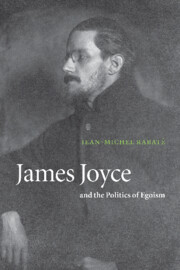Book contents
- Frontmatter
- Contents
- Preface
- List of abbreviations
- 1 Après mot, le déluge: the ego as symptom
- 2 The ego, the nation, and degeneration
- 3 Joyce the egoist
- 4 The esthetic paradoxes of egoism: from negoism to the theoretic
- 5 Theory's slice of life
- 6 The egoist vs. the king
- 7 The conquest of Paris
- 8 Joyce's transitional revolution
- 9 Hospitality and sodomy
- 10 Hospitality in the capital city
- 11 Joyce's late Modernism and the birth of the genetic reader
- 12 Stewardship, Parnellism, and egotism
- Notes
- Bibliography
- Index
1 - Après mot, le déluge: the ego as symptom
Published online by Cambridge University Press: 22 September 2009
- Frontmatter
- Contents
- Preface
- List of abbreviations
- 1 Après mot, le déluge: the ego as symptom
- 2 The ego, the nation, and degeneration
- 3 Joyce the egoist
- 4 The esthetic paradoxes of egoism: from negoism to the theoretic
- 5 Theory's slice of life
- 6 The egoist vs. the king
- 7 The conquest of Paris
- 8 Joyce's transitional revolution
- 9 Hospitality and sodomy
- 10 Hospitality in the capital city
- 11 Joyce's late Modernism and the birth of the genetic reader
- 12 Stewardship, Parnellism, and egotism
- Notes
- Bibliography
- Index
Summary
On July 20, 1998, the editorial board of the Modern Library, a division of Random House – a jury made up of ten writers, critics and editors, among whom were A. S. Byatt, William Styron, Gore Vidal, Shelby Foote and Christopher Cerf – revealed to the public the list they had drawn up of the hundred best novels of the twentieth century. Joyceans from all over the word could rejoice: Ulysses came up first, soon followed by A Portrait of the Artist as a Young Man in the third position. More unexpected but quite as heartening for fans was the fact that Finnegans Wake had found its way into the list as number seventy-seven. No doubt Joyce would have loved the elegant numerological progression: 1 – 3 – 77. As a new century begins, perhaps the time has come for another assessment: will Joyce's stature still tower above the English-speaking world in the twenty-first century, or was this critical acclaim just a way of leaving behind us an embarrassing literary monument? In 1998, moreover, the backlash was immediate, the ten jury members were denounced as elitist and sexist by disgruntled cavilers. Had they been twelve, they might have been identified with the apostles of a new Joycean creed – as the famous collective study Our Exagmination Round His Factification For Incamination of Work in Progress launched the ironical concept as early as 1929, just before the world economy collapsed and Joyce's personal life became fraught with diffculties.
- Type
- Chapter
- Information
- James Joyce and the Politics of Egoism , pp. 1 - 23Publisher: Cambridge University PressPrint publication year: 2001



